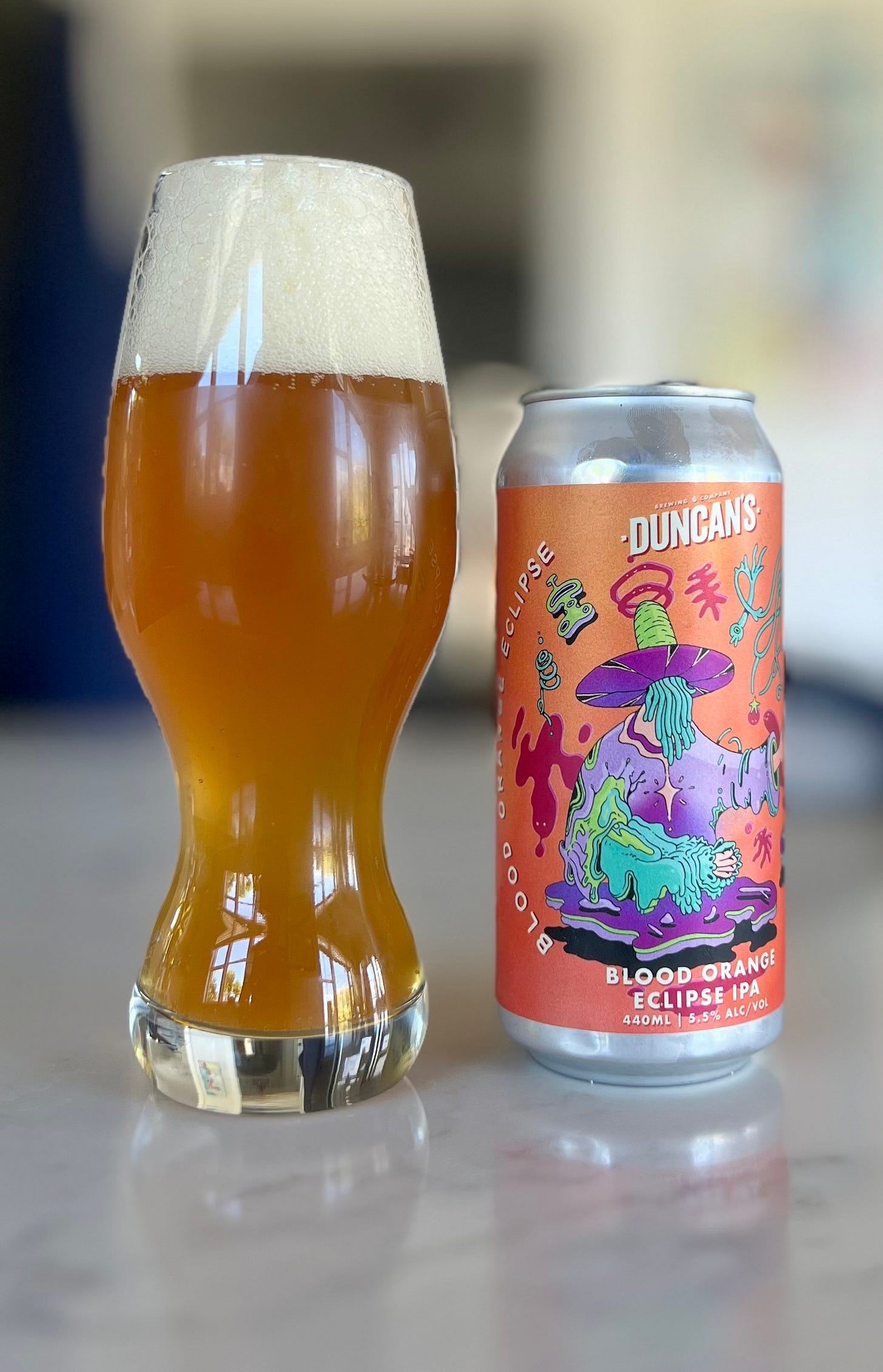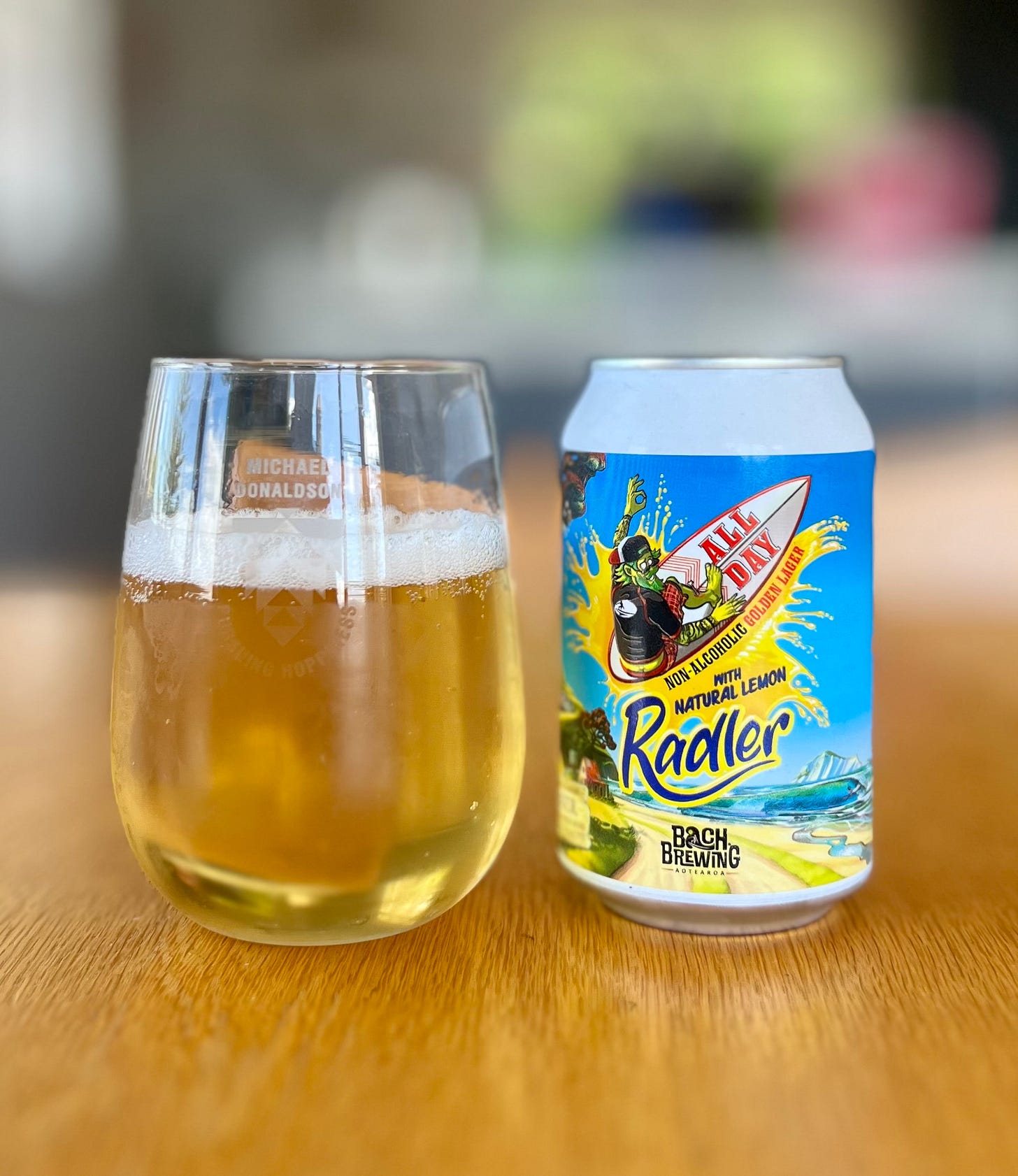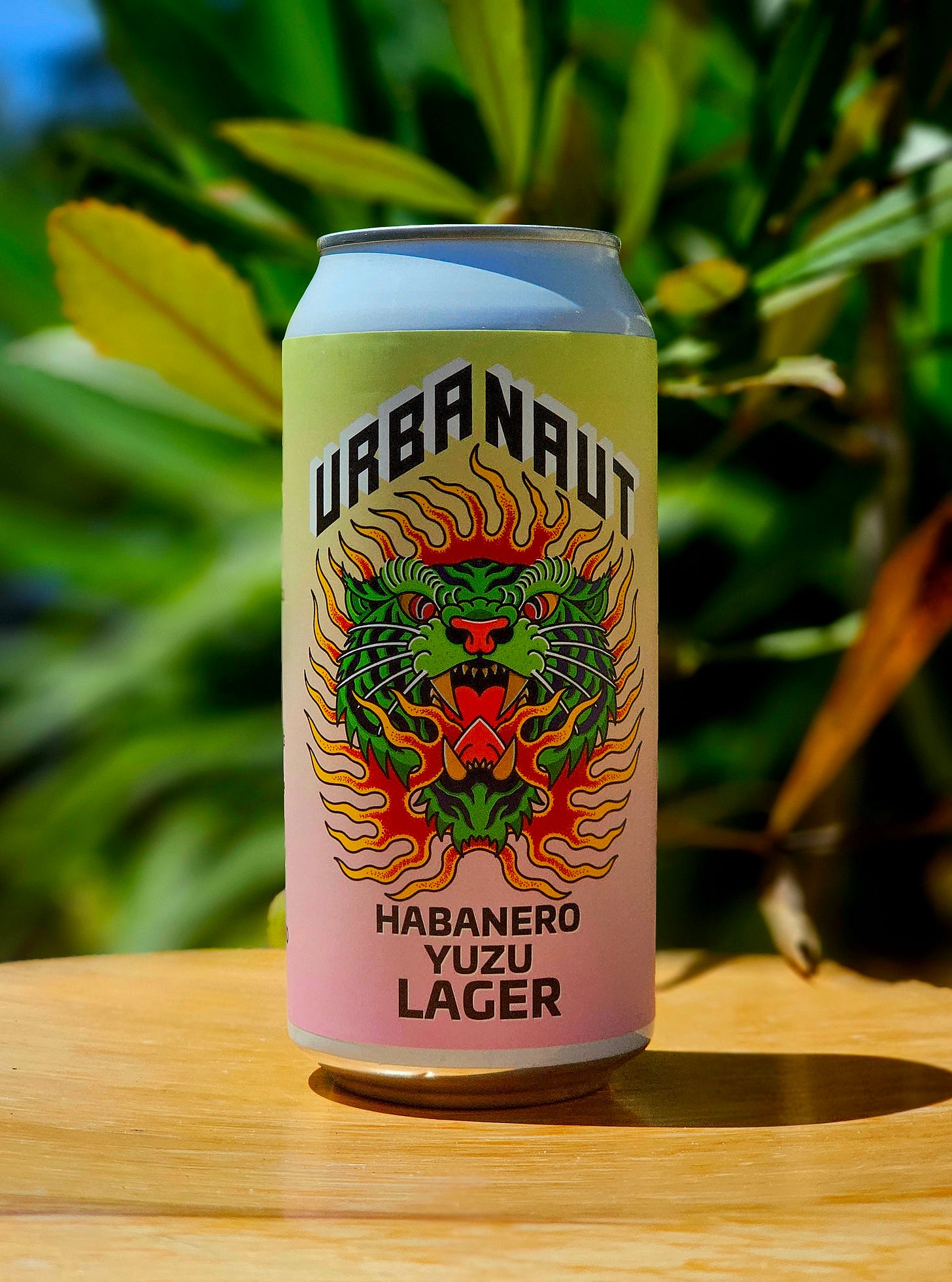Beer's multi-billion dollar global impact
Jason Bathgate to take over Townshend site in Riwaka. Bach Brewing renovates Radler. Why cheese and beer are a perfect match ... for your liver. Shining Peak takes on Guinness (sort of).
Welcome to Friday Night Beers for what, I guess, is a super-long weekend for many of you.
Before we jump into this week’s news and reviews, just a quick update on the story from last week about Jason Bathgate leaving McLeod’s and moving to Nelson … here’s a quick update that just landed via Facebook:
After nearly nine years with McLeod’s Brewery, it’s time for a new adventure.
I’m happy with all we’ve achieved as a team here in Northland, & as Head Brewer & part-owner of McLeod’s Brewery, I’ve learned a great deal & have made good beer which is, ultimately, what the brewing business is about.
It’s with that in mind that my wife & I are returning to the Nelson-Tasman region at top of the South Island. Our goal is to continue making beer albeit on a much smaller & localised scale - a dream we’ve had for some time. I guess you could say we’re getting back to the base, back to the simplicity of beer.
We’re taking over the tasting room & brewery space currently occupied by Townshend Brewery on SH60 in Riwaka, one of our favourite places in New Zealand.
Martin Townshend will continue making his beer & further his iconic brand in a different location. We’ve known Martin for years, & we’re chuffed at the opportunity before us.
It’s early days, so suffice to say we’ll share details as time goes on.
Thanks to everyone who has supported me during my time in Northland. We’re looking forward to seeing you in Riwaka soon!
Global Beer data
Last week I mentioned, fleetingly, a report on beer’s economic footprint commissioned by the Brewers Assocation and Brewers Guild.
There’s a good infographic that relays all the relevant information.
The nutshell elements are these:
Beer accounts for 0.9% of New Zealand’s GDP
Beer employs 1.3% of the workforce
Beer generates 1.6% of the country’s tax revenue
Just this week a global survey based on similar parameters was released by World Brewing Alliance in conjunction with Oxford Economics.
Their data globally showed:
Beer accounts for 0.8% of global GDP
Beer employs 1% of the global workforce
Beer generates 1.3% of global taxes.
So New Zealand is close to the global averages in all three sectors.
You can drill down into the global report for what happens in individual countries — the New Zealand data is similar to that released by BA and BGONZA given the different time periods involved.
One country that was highlighted globally is Cambodia.
The numbers there are astounding
5.8% of GDP
6.8% of the workforce
20.4% of government revenue!
The report noted that beer generated the equivalent to $1 in every $119 of global economic output. In terms of employment, the sector supported an estimated 33 million jobs—or one in every 100 jobs worldwide. Its contribution in terms of tax revenues was also significant: the sector is estimated to have supported a total of $376 billion in global tax revenues.
Overall, this report has shown that the global beer industry generates a positive economic feedback loop, driving economic activity and supporting employment and prosperity on a global scale with a notable impact on some of the world’s less developed nations.
Beer of the Week No 1
There’s a theme of sorts to the reviews this week — totally unintended, it’s just how the cards fell with beer selections — but let’s just say it’s “fruity”.
Duncan’s — now the only brewery in Paraparaumu following Tuatara’s move to Brewtown — are genius when it comes to getting fruit into beer and this latest release, Blood Orange Eclipse IPA, is no exception.
It does exactly what it says on the can — with an intense blood orange flavour popping out. It’s like freshly squeezed orange juice has been added to the beer.
The hops are selected to complement the orange notes, particularly Amarillo, which has a distinct sweet orange character.
There’s a sherbet-like popping texture to the carbonation and a gentle prickly bitterness.
And despite all the sweet citrus notes it finishes dry and refreshing. An almost perfect late-summer beer with layers of aroma, flavour and texture and a big squeeze of flavour for the 5.5% ABV.
You can find this at select New World stores this month — your home of craft beer.
Tim’s Beer of the Week
Hefeweizen is one of those slightly cursed styles that seems to be forever relegated to the margins of craft beer, and I get why. As an intrinsically different drop, the more a brewer embraces what makes them special, the further the beer will land outside the mass-market’s tastes. But reign it in too far and the beer ends up insipid and boring. The result is a meanly small target, and it’s a testament to so many of our brewers’ love for the style that they routinely hit it anyway, and Banana Man from Beers (Christchurch) is one of them.
Banana certainly makes an appearance in the aroma, along with rising bread dough and a hint of blueberry and bubblegum. The palate strikes entirely different, smooth at first but quickly moves into dry, pithy citrus, tangy spent mash and a jazzy yeast funk that lingers long into the finish. Refreshing, satisfying, and much weightier than its moderate 5.6% ABV strength would imply.
Cheers to cheese
Who loves cheese? Well, there’s even more reason to cut yourself a slice or two tonight.
According to a study published in the September 2023 issue of the Journal of Functional Foods, probiotics found in certain cheeses can not only alleviate hangovers, but they can also help prevent alcohol-induced liver damage.
Essentially these probiotics help metabolise ethanol and therefore relieve your liver of some heavy lifting in that department. How good!
Eating Cheese Can Improve Alcohol Metabolism, According to Scientific Study | VinePair
Beer of the Week No 2
I talked last week about the potential radler/shandy boom with reference to Firestone Walker’s “turbo radler” range which clocks in at 8% ABV. Well, now we’re going to the other end of the spectrum …
Radler is a century-old German term for a beer blended with lemonade or other citrus soft drink. To many, this would be a shandy.
The Radler story, which seems to have some substance, started when a new cycle trail opened in the Munich countryside in 1922. Thousands of riders inundated a pub on the trail during the day and they all wanted beer. The innkeeper didn’t have enough so he blended it with lemonade to create a low-alcohol, refreshing variant. He coined his drink “Radler,” the German word for “cyclist.” Radler has since come to mean any beer mixed with citrus juice – whether it’s lemon, grapefruit, or orange.
For a long time in New Zealand we didn’t see many Radlers (one in fact) as the term was trademarked by DB Breweries and used solely for Monteith’s Radler. But DB let the trademark lapse a couple of years back and Bach Brewing are (as far as I can tell, and happy to be corrected) the first to use the term on a label since it became available again — for a new addition to their All Day non-alcoholic range.
Applying Radler to a non-alc beer is a great idea, as the style was typically low ABV, around 2-4%.
Here the aroma is pure lemonade — it bursts out the glass — and what follows is refreshing but also super-low in sugar as Bach have used a lemon flavour rather than lemonade.
It’s rather tasty and enjoyable.
Bach have also packaged up their three other All Day non-alcoholic beers — IPA, Hazy IPA and Pilsner — in a mixed six-pack.
Excise tax campaign heating up in Australia
If you think New Zealand’s small, independent brewers have it tough when it comes to excise tax (believe me, they do), our friends across the ditch are struggling even more. And that’s despite a $350,000 per annum rebate.
In New Zealand, excise duty on beer over 2.5% is $36.90 per litre of alcohol. In Australia, it’s $61.57 per litre of alcohol.
Not surprisingly, there’s a lot of campaigning going on over there at the moment around the survivability of small, independent breweries. One post I saw this week noted that around 50 breweries in Australia folded or went into voluntary administration last year.
Christen McGarry, chief financial officer at Your Mates Brewing, wrote succinctly about it on LinkedIn this week:
The Beer Excise System Is Broken – And It’s Holding Back Independent Australian Breweries
At Your Mates Brewing Co. we’ve worked hard to grow from a small local brewery into a successful independent beer brand. We pride ourselves on celebrating everything that’s good about beer and not dwelling on challenges, but as we’ve scaled, we’ve encountered one of the biggest barriers to achieving our mission to connect more people through beer—a beer tax system that punishes growth and protects the dominance of foreign-owned brewing giants.
Here’s the problem:
💰 40% of the price of a pale ale schooner goes to the ATO – In the last 20 years, excise has more than doubled, taking an ever-growing cut of every beer sold. With automatic increases every six months, this tax burden keeps compounding, making beer more expensive for producers, retailers, and consumers. Australia has one of the highest excise tax rates in the world.
🍺 Beer is taxed more than wine & cider – Over the past two decades, beer excise has increased every six months, making it one of the highest-taxed alcohol categories in Australia. Meanwhile, wine taxation has remained largely unchanged under the WET (Wine Equalisation Tax), which is based on value rather than alcohol content.
🚧 Mid-sized independent breweries hit a tax wall – The government offers an excise refund for small brewers up to $350,000, but once you pass that threshold, every litre of beer is fully taxed at the same rate as the biggest multinational brewers. This creates a massive financial barrier to growth, making it harder to scale, invest in jobs, and compete fairly.
🏢 Who benefits? The multinational beer giants – Large, foreign-owned breweries have the scale to absorb tax increases and dominate distribution. Meanwhile, independent breweries that try to grow beyond a certain size face a steep financial penalty—one that multinationals may not even notice. These companies can make more beer in a day or two than we can in an entire year.
The current system is not sustainable for a thriving independent beer industry. If we want to see more homegrown Australian breweries succeed, we need change.
💡 What needs to happen?
✔️ Increase the excise refund threshold to allow independent breweries to scale sustainably.
✔️ Flatten the tax rate so mid-sized brewers don’t face a financial cliff.
✔️ Make beer taxation fairer compared to wine and cider.
We’re not asking for special treatment—just a fair go. If you want to see more independent Aussie beer in your local, it’s time to fix this broken system.
I think we can expect similar campaigning in New Zealand, as all the points he makes are equally valid here … and there’s no relief whatsoever for small breweries in New Zealand, so they suffer even more relative to the multinationals.
Dusty’s Beer of the Week
What do you get when you combine habanero, yuzu & lager? You get one of the feel-good hits of the summer thanks to the party forever crew at Urbanaut Brewing. Their Habanero Yuzu Lager is poppin’ with sweet tart components of yuzu, the warming prickly heat of habanero and that built-for-summer crispy boi lager freshness ... ripper!
Capping the Peak
If you’ve been paying attention you’ll know the online phenomenon that is “splitting the G” when taking the first sip of Guinness.
Well, Shining Peak said, “hold my pint” and they have come up with their own variation: capping the peak. That is, leaving the foam sitting atop the image of Mount Taranaki on their branded glasses.
Here’s a bit of fun from the crew at Shining Peak and I do advise watching right to the end!
Beer of the Week No 3
A break away from the fruit-driven beers … over the past year or so we’ve seen quite a few breweries play with the Kolsch-style.
I do like this style of beer for being light, easy-drinking, refreshing etc. But it’s also, when done well, a balanced combination of delicate fruit esters and floral hops. It’s a style of beer you can drink mindfully and in doing so fully appreciate the intricacy. Or you can just drink it and enjoy the simplicity without having to over-think it.
And Laughing Bones have done a very good job with Bierzeit (Beer Time). It’s totally smashable but also interesting and flavourful to boot.
Recommend highly for connoisseurs of this style.
CUB boss exits after divisive campaign
Asahi says the departure of Carlton & United Breweries (CUB) chief executive just days after a backlash against the Great Northern brand are unrelated.
Great Nothern earned the ire of 4WD owners and fishers over a “woke” campaign to raise funds for national parks in Australia.
Danny Celoni will leave in June, CUB announced on Wednesday. A spokesman denied his departure is linked to the controversy, saying he decided late last year to move on.
Drinkers abandoned Great Northern last month after it launched a controversial Outdoors For A Cause campaign.
The company, which focuses heavily on outdoor activities in its marketing, vowed to match donations up to $200,000 when customers donated to the Foundation for National Parks and Wildlife.
But many believed the brewery was raising money to lock them out of outdoor spaces.
National parks in Australia often charge entry and camping fees and have more restrictions than state forests.
Social media was flooded with videos of customers pouring the company’s beer down the drain and driving their cars over six packs.
Meanwhile, Asahi’s restructure means Andrew Campbell is no longer the New Zealand CEO, but he will stay on as country manager after Asahi opted to consolidate its three CEO positions in New Zealand and Australia.
That’s it for me for this long week edition. Enjoy the beers and drive safely.
Michael












Re the cheese 'study', all rat experiments tell us for certain is that a bunch of rats were killed. But if probiotics do work in humans in the way suggested, we'd be better off chomping down on sauerkraut or kimchi as they contain far higher concentrations than almost all cheeses.